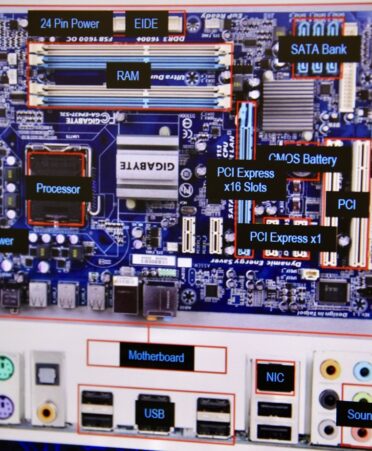(MARSHALL, Texas) – Phishing emails offering fake jobs or attempting to con one out of money have made most people familiar with virtual scams. That is why Texas State Technical College’s Cybersecurity program is teaching the next generation of data protectors.
“It’s an extremely broad field,” Amy Hertel, lead Cybersecurity instructor at the Marshall campus, said. “There are so many moving parts behind the scenes. If you’re a person who’s interested in it and you’re willing to put the time into it, you can make a career out of it.”
With everything from health care data to bank records being digitized in modern society, TSTC’s Cybersecurity program is constantly staying on top of the latest technology. Hertel instructs her classes in data protection by keeping basic questions in mind: How does a network function? How do you identify when a problem is happening, and how do you correct it?
Hertel always encourages her students to take part in one of the many national cybersecurity competitions held throughout the year. The majority of them award winners with scholarships.
Stephen Kimbro, an alumnus of what today is TSTC’s Computer Networking and Systems Administration program, has fond memories of his time at the college. He works as the regional technology director for CHRISTUS Good Shepherd Health System in Longview.
“Here at CHRISTUS Good Shepherd Health System, we like to bring in TSTC graduates because we know they have a good technical understanding after graduating,” Kimbro said. “Whether the curriculum is in desktop support or the Cybersecurity program, we know they come to us with a great skill set and understanding of technology for today’s world.”
TSTC student Ki’untrez “Trez” O’Quinn had already received his bachelor’s degree in Computer Information Systems from Grambling State University but came to TSTC to focus on cybersecurity. He is currently working toward his Associate of Applied Science degree.
“I like the security assets of things like stopping cybercriminals, stopping hackers, things like that I find interesting,” O’Quinn said. “I think this is the best school for technical programs.”
With her family unable to afford video game consoles as she grew up, Cybersecurity student Dayana Martinez discovered a whole new world after playing her first video game as a teenager. From there, her love for technology began to blossom, leading to her pursuing an Associate of Applied Science degree at TSTC.
“TSTC makes me feel so assured, and I can ask a question without being judged,” Martinez said.
TSTC offers an Associate of Applied Science degree and certificates of completion in Cybersecurity at the East Williamson County, Fort Bend County, Harlingen, Marshall, North Texas and Waco campuses, as well as online. An advanced technical certificate in Digital Forensics Specialist is offered 100% online.
Cybersecurity is one of TSTC’s Performance-Based Education programs, meaning that students can move through their training at a flexible pace.
According to onetonline.org, digital forensic analysts in Texas can earn a median salary of $83,340 a year. The website projected that there would be a 20% increase in the number of such jobs in the state from 2020 to 2030.
For more information on TSTC, go to tstc.edu.

